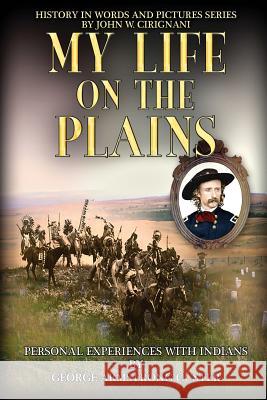My Life on the Plains: Personal Experiences with Indians » książka
My Life on the Plains: Personal Experiences with Indians
ISBN-13: 9780578166742 / Angielski / Miękka / 2015 / 454 str.
MY LIFE ON THE PLAINS, written by General George Armstrong Custer, is one of the best firsthand accounts of military life on the American western frontier. Custer's "Personal Experiences with Indians" are a primary source for research into United States political and military affairs with Native Americans in the 19th century. In the History in Words and Pictures edition by John Cirignani, MY LIFE ON THE PLAINS has been edited to a contemporary reading experience and supplemented with dozens of photographs that bring General George A. Custer's words to life. For those who wish to see American history through the words and eyes of those who made it, MY LIFE ON THE PLAINS is a must read. The book reveals substance behind an American legend that runs far deeper than the last day of his life. In contrast to revisionist depictions of the Civil War hero such as Son of the Morning Star, Custer comes across as intelligent and thoughtful with a robust sense of humor. Notably, MY LIFE ON THE PLAINS is the root of a political conflict between Custer and Ulysses S. Grant largely overshadowed by the tragic Last Stand. In it, Custer boldly calls out corruption in the government as the catalyst behind the Indian unrest. This criticism likely contributed to the disaster at the Battle of the Little Bighorn. It's easy to come away from reading the book with the notion that the "Most Interesting Man in the World" isn't a pitch man for Dos Equis, but in fact the former commander of the 7th United States Cavalry. Here's what others said: SIOUX CHIEF SITTING BULL - "They kept in pretty good order. Some great chief must have commanded them all the while." "Up there where the last fight took place, where the last stand was made, he stood like a sheaf of corn with all the ears fallen around him." "My people did not want his scalp." (The interviewer then asks why.) Sitting Bull answers; "I have said; he was a great chief." ELIZABETH B. CUSTER, CUSTER'S WIDOW - "My husband had many enemies, and none of them were Indians. His rivals sent him on a suicide mission with too few men and not enough ammunition." FREDERICK WHITACKER, CUSTER'S BIOGRAPHER - "Few men had more enemies than Custer, and no man deserved them less. The world has never known half the real nobility of his life, nor a tithe of the difficulties under which he struggled."











